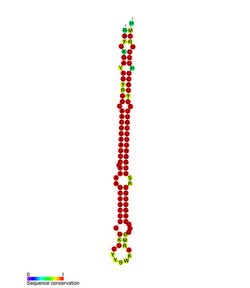Biology:miR-191
| miR-191 | |
|---|---|
 Conserved secondary structure of miR-191 microRNA precursor | |
| Identifiers | |
| Symbol | miR-191 |
| Alt. Symbols | MIR191 |
| Rfam | RF00764 |
| miRBase | MI0000465 |
| miRBase family | MIPF0000194 |
| NCBI Gene | 406966 |
| HGNC | 31561 |
| RefSeq | NR_029690 |
| Other data | |
| RNA type | miRNA |
| Domain(s) | Mammalia |
| GO | 0035195 |
| SO | 0001244 |
| Locus | Chr. 3 p21.31 |
| PDB structures | PDBe |
miR-191 is a family of microRNA precursors found in mammals, including humans. The ~22 nucleotide mature miRNA sequence is excised from the precursor hairpin by the enzyme Dicer.[1] This sequence then associates with RISC which effects RNA interference.[2]
miR-191 has been found to be dysregulated in many types of human tumour, including those of colorectal,[3] breast and prostate cancers.[4] Despite these cancer links, target genes of the mature miRNA have not been characterised, and it is not known which factors lead to its dysregulation in certain tumour cells.[5]
The expression profile of miR-191 could be implemented in prognosis of acute myeloid leukaemia, with higher than average levels of miR-191 suggesting a lower survival probability.[6]
References
- ↑ "microRNAs: tiny regulators with great potential". Cell 107 (7): 823–6. Dec 2001. doi:10.1016/S0092-8674(01)00616-X. PMID 11779458.
- ↑ "Human RISC couples microRNA biogenesis and posttranscriptional gene silencing". Cell 123 (4): 631–40. Nov 2005. doi:10.1016/j.cell.2005.10.022. PMID 16271387.
- ↑ "Prognostic Values of microRNAs in Colorectal Cancer". Biomarker Insights 2: 113–121. 2006. PMID 18079988.
- ↑ "A microRNA expression signature of human solid tumors defines cancer gene targets". Proceedings of the National Academy of Sciences of the United States of America 103 (7): 2257–61. Feb 2006. doi:10.1073/pnas.0510565103. PMID 16461460. Bibcode: 2006PNAS..103.2257V.
- ↑ "Novel genetic variants in miR-191 gene and familial ovarian cancer". BMC Cancer 10: 47. 2010-02-18. doi:10.1186/1471-2407-10-47. PMID 20167074.
- ↑ "MicroRNA signatures associated with cytogenetics and prognosis in acute myeloid leukemia". Blood 111 (6): 3183–9. Mar 2008. doi:10.1182/blood-2007-07-098749. PMID 18187662.
External links
 |
